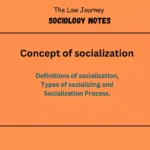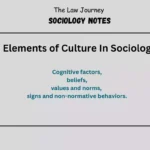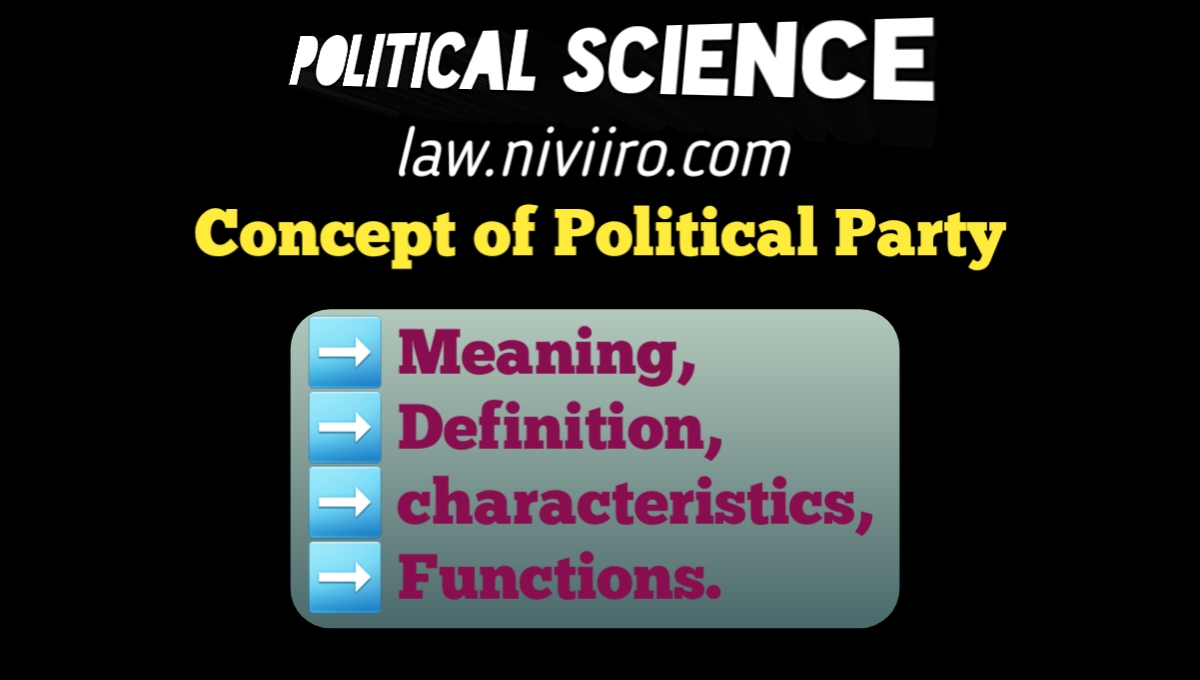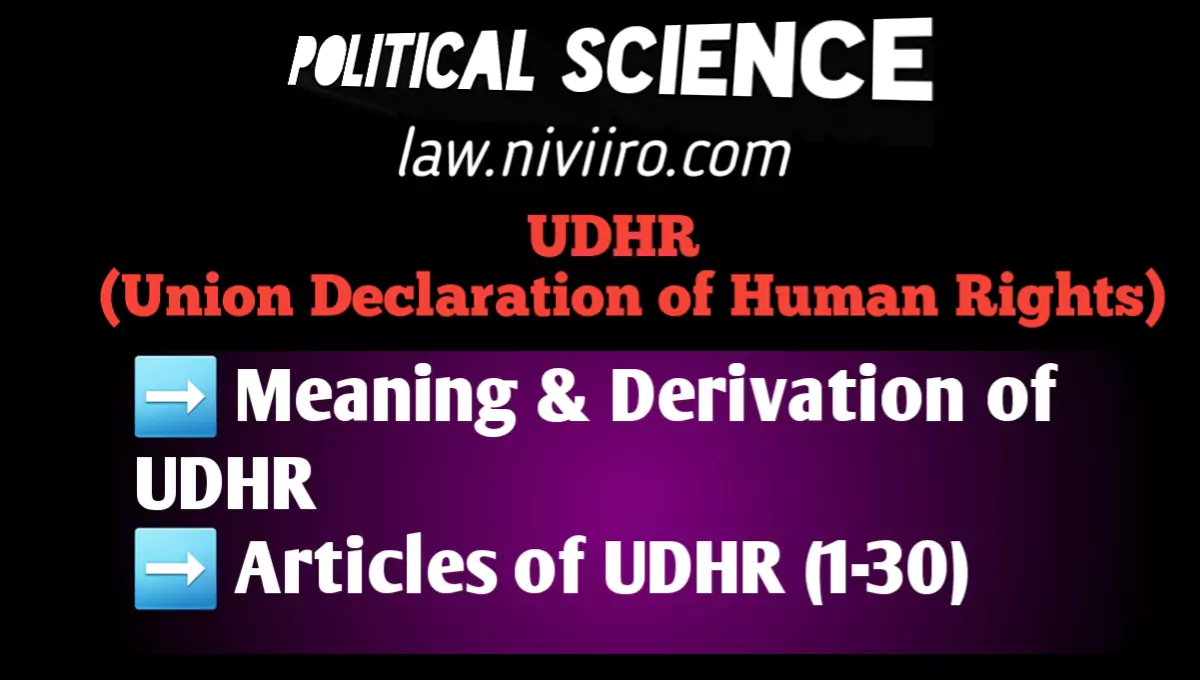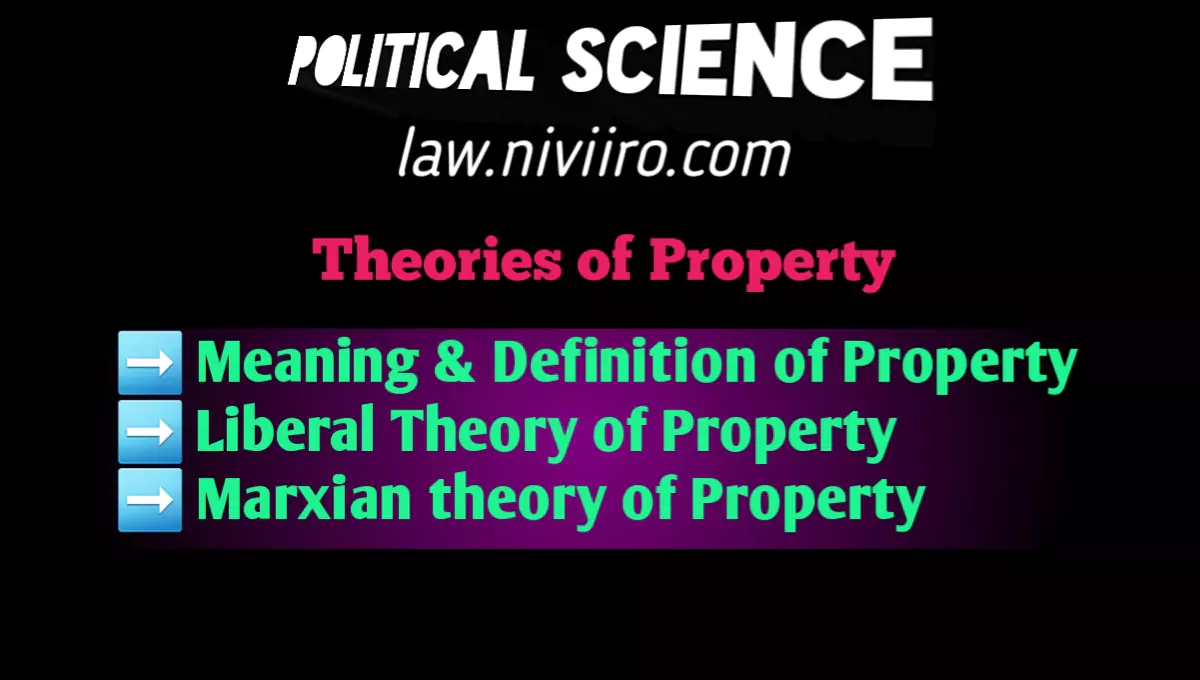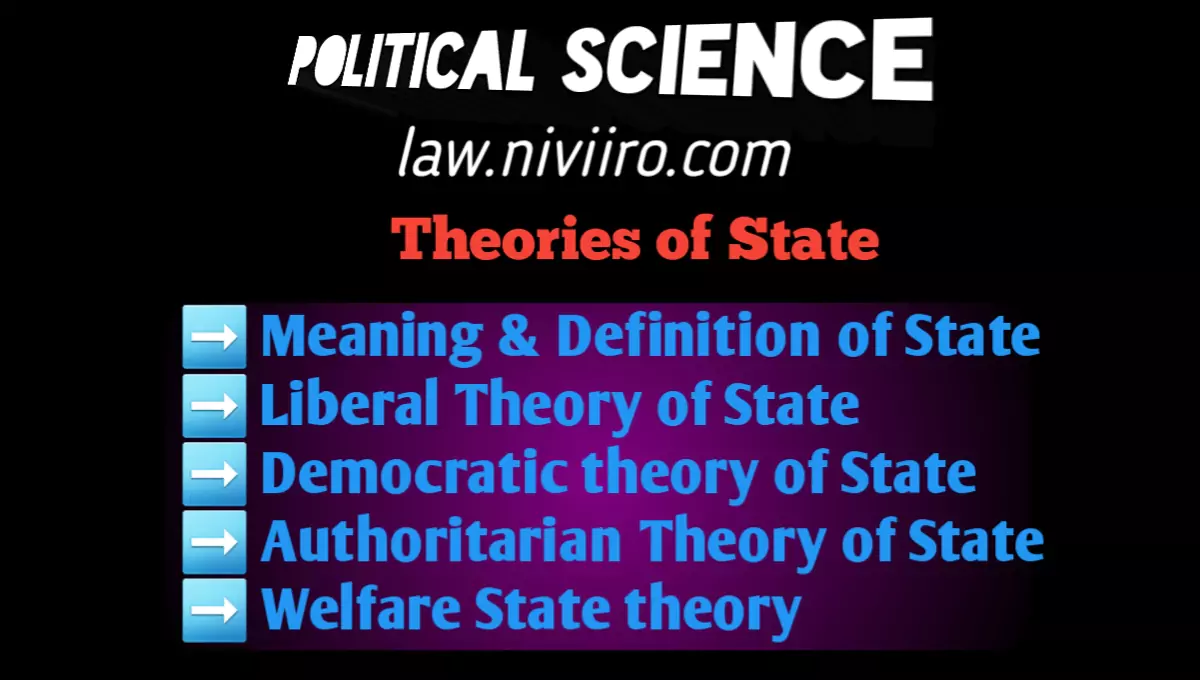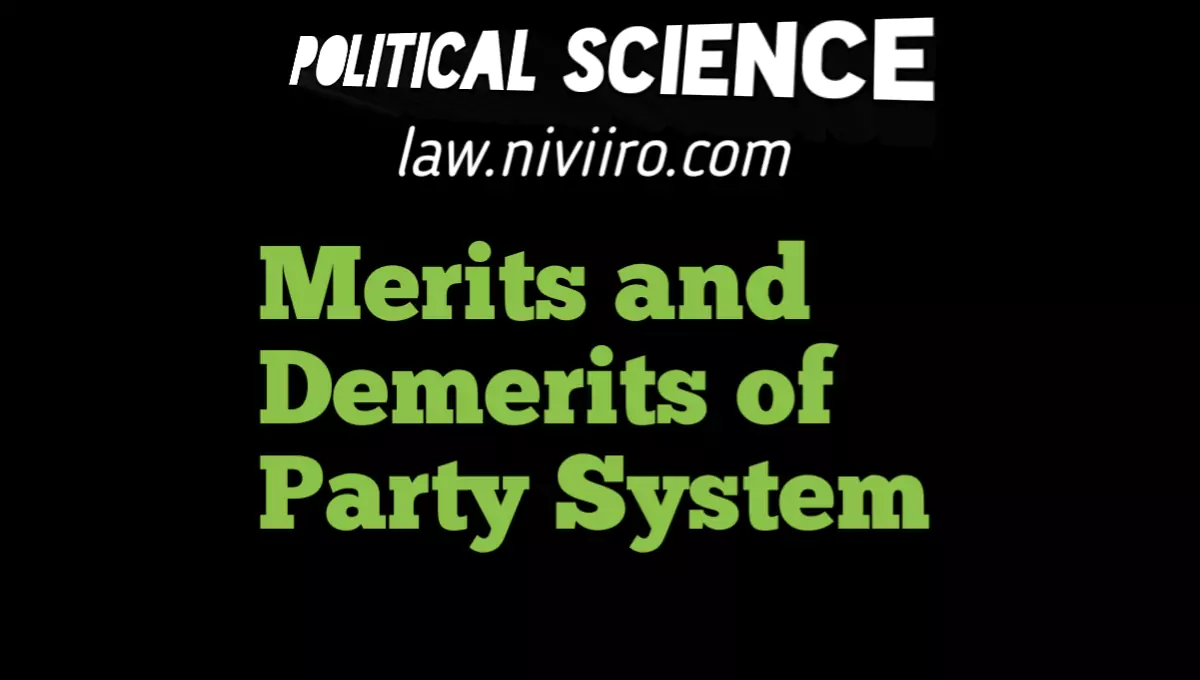The party system is democracy’s lifeblood. It is its driving force or foundation, commonly known as the fourth organ of government. Democracy itself is known as party government, “without political parties”, Maclver observes, “there can be no unified statement of principles, no orderh evolution of policy, no regular resort to constitution by means of which a party seeks to gain or maintain power.”
Finer argues, “Without political parties, an electorate would be either powerless or destructive, embarking on unrealistic programmes that would only destabilise the political machinery.”
Meaning and Definition of Political Party
A political party can be defined as a party of the people, organised on the basis of an ideology, which is always keen to get power and remains continuously involved in the process of politics. Its final aim is to secure political power in the state and to use this power for making and implementing authoritative values of the entire society.
Definitions :
The simplest definition of a political party is given by Stephen Leacock who says “Political party is more or less an organised group of citizens who act together as a political unit. They share o profess to share the same opinions on public questions and by increasing their voting power towards a common end, seek to obtain control of the government.”
- According to Edmund Burk, “A political party is a body of men united for promoting by their joint endeavours the national interest upon some particular principles on which they all agree.”
- Gilchrist defines a political party “as an organised group of citizens who profess to share the same political views and by acting as a polic unit, try to control the government.”
- According to Gettel, “A political party consists of a group of citizens more less organised, who act as a political unit, and who by the use of the voting power aim to control the government and carry out their general policies.”
- According to Maclver, “A political party is an association organised in support of some principle or policy which by constitutional means endeavours to make the determinant of government.”
- Shumpeter, however rejects Burke’s definition and instead defines a political party as “a group whose members propose to act in concert in the competitive struggle for political power. “
As such it is “the great intermediary which links social forces and ideologies to official governmental institutions and relates them to political action within the larger political community.”
Thus a political party is an organised partnership based on ideological unity, which considers itself separate from other parties by a specific programme and which actually and constitutionally participates in politics with the ultimate aim of securing political power in the state.
Characteristics or Essential Elements of Political Parties
Characteristics or Essential elements of Political Parties are:
1. Organisation – A political party is an organised group of people. There is a party constitution that describes the party’s goals, objectives, policies, and organisational structure. Without adequate organisation, no party can exist and compete for power. The organisation provides strength to the members of the party by allowing them to pool their resources and abilities to help the party achieve its goal.
In the words of MacIver, “Without such party organisation, there can be no unified state of principles, no orderly evolution of policy, no regular resort to institution by means of which a party seeks to gain or maintain power.”
2. Capturing Power-The ultimate goal of a political party is to secure political power in the state and utilise that power to create and implement authoritative values for the entire society while remaining actively involved in the political process.
3. Belief in Peaceful and Constitutional Conflict Resolution – Each political party strives to carry out its policies in a peaceful and constitutional manner. Political parties use only constitutional tactics and completely adhere to the framework of the constitution. Any organisation that uses violent and unconstitutional methods to seize power cannot be approved or recognised as a political party. All political parties must believe in peaceful and constitutional means.
4. Promotion of National Interests – A political party will always strive to promote national goals as opposed to selfish, sectarian, or communal interests. Burke’s conceptualisation of political party “as a body of men united for promoting by their joint endeavours the national interest….” is very apt.
When a political party’s actions are directed toward boosting sectional interests and selfish purposes, it degenerates into a faction. A political party must work with the self-perception that it is a component of a whole and that it can only protect its own interests by satisfying national (whole) interests.
5. Unity of Common Principles -In order to form a political party, individuals must agree on certain fundamental principles of public policy and have their own political ideology. Faith in accepted ideals or a unified political ideology is a source of strength for the party’s unity and operationalability.
It enables a political party to participate in a concerted political struggle and accomplish the intended goal, namely political power. Without agreement on fundamental principles, no party can remain indefinitely and maintain member cooperation and public support.
To sum up a political party is a distinct (separate) group (partnership) of the people, actively and peacefully participating in a political parties (decision-making) for the promotion of natural interests (interests of the whole community).
Functions of Political Parties
Political parties perform several important functions in modern political system.
Peter H. Merkel lists six types of functions, which the political parties perform in a democratic system:
1. Recruitment and selection of leadership personnel for government offices, 2. Generation of programmes and politics for government, 3. Coordination and control of governmental organs, 4. Societal integration through satisfaction and reconciliation of group demands or the provisions of a common belief system or ideology, 5. Social integration of individuals or mobilisation of support by political socialisation, 6. Counter-organisation or subversion.
We can discuss the functions of the political parties under the following heads:
1. Party Role in Elections – A related facet of candidate selection in competitive systems is the organised effort to get them elected and re-elected. In fact, there is a lot of evidence that modern parties sprang from the need for elected parliamentary representatives to form electoral committees or grass-roots organisations to assure their re-election. During the election campaign, parties present their different manifestos, which include past performance successes as well as future pledges.
The manifestos of the various parties interact to define the campaign’s issues and to divide voters into groups defined by these topics.To contest and win elections is a major function of the political parties. Without elections there can be no democratic government and without political parties there can be no real elections. That is why it is usually said, “no party, no democracy.”
2. Government – Making Government making is virtually a party business. In a parliamentary system, the party with the most votes wins the power to form the government. Parties serve as legislatures in every political system.The party leaders, who get elected as representative of the people, sit in the legislature and formulate laws. Thus parties play an important and essential role in government making.
3. Policy Formation – Political parties play a significant role in policy formation. These make order out of the chaotic mix of opinions and possibilities by presenting their programmes to the people and securing their support on critical policy matters.
They plan and run for elections, attempting to win by adopting positions on policy issues and presenting them as options between parties. Political parties play an essential role in policy-making and policy execution by raising issues, providing alternative policies, choosing sides, and fostering national discussions on a variety of themes, challenges, and policies. They play an important role in opposing government policies that they believe are not in the best interests of the country. As a result, political parties actively participate in policy formulation.
4. Goals and Value Formation-Political parties present concerns and define societal goals. Each political party operates within the framework of an approved political ideology, which serves as the conceptual foundation for all of its policies, decisions, programmes, and actions. After internal discussions and debates, a political party formulates aims and principles that it believes should be embraced and supported by society in order to take deliberate, methodical, and firm actions toward the socioeconomic, political, and overall growth of the people.
5. Selection of Candidates – As James Bryce points out in describing american political parties before World War I. “the chief thing is the selection of candidates,” for public office. The selection procedure in modern democracies is theoretically designed to give the majority of voters a true choice, albeit one constrained by prior selection on the part of the parties.
As E.E. Schattsneider pointed out, voters would be unable to make a meaningful decision between a theoretically unlimited number of candidates. The choosing of political parties, like all recruitment processes for important posts, has qualitative repercussions.
6. Integration of Society – Parties brings together disparate interests, bridges geographical divides, and fosters togetherness. Political parties are forming organisations. They help an individual integrate into the political system by playing an important role in the processes of socialisation, mobilisation, and engagement. Parties bring together disparate cultural, linguistic, and regional interest groups and channel them into a unified framework.
They integrate people from various social classes into the national mainstream. In the United States, the Democratic Party was successful in uniting southern conservatives and northern liberals. The Indian National Congress gave a venue for people spread throughout a wide subcontinent in India.
7. Maintaining discipline and control over members – Parties provide political stability and continuity in the political system. This is accomplished through the use of the party flag and party discipline. The government could not be sure how long it could stay in power if there were no parties, if members of legislatures were utterly disorganised and created by merely a mass of men voting at will and in different ways at different times.
No legislature can function smoothly and efficiently without political parties. Each party maintains control and discipline over its members. It promotes teamwork among them.
8. Control and Coordination of Government – Control and coordination of government is a significant function of political parties. Many constitutional democracies have so many built-in checks and divisions of governmental authority that if the parties did not contribute to bridge the artificial chasms made up by bicameralism, the separation of powers, and federalism, they would be constantly deadlocked. Large, diverse, and new nations would be unable to maintain internal coherence and political consensus without the assistance of political parties.
9. Act as Opposition – A party that is unable to seize power can serve the people by acting as an effective opposition party. It takes on the role of criticising and opposing the government’s policies. Its criticism of the ruling party should be forceful, but also constructive and dignified. As an opposition party, a political party can keep the administration on track and accountable for its acts of omission and commission.
10. Public Opinion Formation – One of the most essential responsibilities of political parties is to give coherence and meaning to ideas, desires, and ambitions, as well as to clarify public opinion on numerous subjects and situations.
In the words of Lowell, “Their primary functions and the true reason for their existence, is bringing public opinion to focus and framing matters for a public decision. They are instruments for clarifying public opinion and, as a result, allowing the state’s government to base or adjust its policies on popular opinion. “Political parties,” Bryce writes. “bring order out of the chaos of a multitude of voters.” Their major responsibility is to organise and clarify popular sentiment or opinion.
11. Social Welfare Functions – As part of their ‘non-political activity,’ political parties also conduct social welfare functions. The parties aim to alleviate people’s suffering amid natural disasters like as famines, earthquakes, diseases, wars, and storms. They also work to eliminate social ills like as the dowry system, illiteracy, untouchability, sickness, and ignorance. They coordinate the operations of numerous socioeconomic interest groups and contribute to society’s progress.
Conclusion
The parties are essential for every political system. However, the nature and scope of the roles of political parties depend upon the nature of the political system in which they operate. These play a key role in the process of politics. “In the contemporary era of democracy, political parties have become indispensable parts of all political systems. They now play a direct and vigorous role in the political process.”
Related Post
What do you mean by Political Party ?
A political party can be defined as a party of the people, organised on the basis of an ideology, which is always keen to get power and remains continuously involved in the process of politics. Its final aim is to secure political power in the state and to use this power for making and implementing authoritative values of the entire society.
define Political Party ?
According to Edmund Burk, “A political party is a body of men united for promoting by their joint endeavours the national interest upon some particular principles on which they all agree.”
Gilchrist defines a political party “as an organised group of citizens who profess to share the same political views and by acting as a polic unit, try to control the government.”
What are the Characteristics or Essential Elements of Political Parties ?
1. Organisation – A political party is an organised group of people. There is a party constitution that describes the party’s goals, o secure p…….
3. Belief in Peaceful and Constitutional Conflict Resolution – Each political party strives to carry out its policies in a peaceful and constitutional manner………..
What are the Functions of Political Parties ?
1. Party Role in Elections – A related facet of candidate selection in competitive systems is the organised effort to get them electe…….
2. Government – Making Government making is virtually a party business. In a parliamentary system, the party with the most votes wins the power to form the government. Parties serve as legislatures i……..
3. Policy Formation – Political parties play a significant role in policy formation. These make order out of the chaotic mix of opi………………..
References
- Prof. H.C. Verma, Modern Political Theory
- J.C. Johari, Political Science
- M.P. Jain, Political Theory liberal and Marxiam
- Foundations of Political Science, Dr. Sunita Gangwal
- Prof. S.L. Verma, Modern Political Theory
- R.C. Agarwal, Political Theory
- V.D. Mahajan, Political Theory













